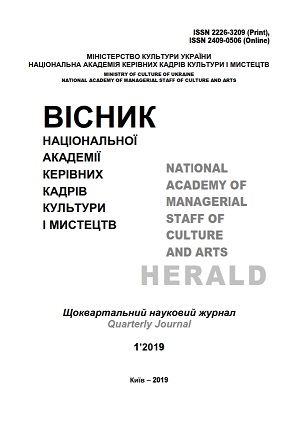Культурницька парадигма у творчій спадщині Миколи Реріха
Cultural Paradigm in Mykola Rerikh’s Works
Author(s): Julia Sergeevna Sabadash, Josef Moyseyovych NikolchenkoSubject(s): Social Philosophy, 19th Century Philosophy, Contemporary Philosophy, Culture and social structure , Sociology of Culture, Phenomenology
Published by: Національна академія керівних кадрів культури і мистецтв
Keywords: Mykola Rerih; humanism; culture; cultural paradigm; cultural heritage; spiritual ideal; Rerikh‘s Pact; Banner of Peace;
Summary/Abstract: The aim of the work is to investigate live and creative way of the famous artist, archeologist, philosopher, public figure of the last quarter of the XIXth – the first part of the XXth century Mykola Rerikh, to comprehend the dynamics of the general cultural processes in the specified period that influenced his works and world-view. Methodology of the research is in the application of the historical and cultural, systematizational, biographical, cultural and theoretically generalizing methods. Methods marked let present the dynamics of the changes in Mykola Rerikh‘s world-view in the context cultural and historical processes of the development of the world civilization at the end of the XIXth – the first part of the XXth century and systematization of separate phenomena of the world culture. Scientific novelty is conditioned of the wide usage of the biographical methods, basing onto the analysis that unites ideals of the world culture and Mykola Rerikh‘s fortune. Conclusions. Having analyzed Mykola Rerikh‘s cultural activity we prove that it becomes obvious his affection to humanistic principals. He thinks a lot about culture, protection of the cultural treasures, high spiritual purpose of art, about cultural cooperation of peoples. Culture forms on the basis of unlimited cognition, educated work, tireless creativity of man and his noble life. On the top of the Culture is a real selfless love for humanity and the Motherland, for nature and each person as the highest value.
Journal: Вісник Національної академії керівних кадрів культури і мистецтв
- Issue Year: 2019
- Issue No: 1
- Page Range: 91-95
- Page Count: 5
- Language: Ukrainian

